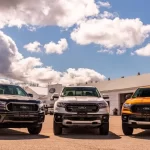Getting your first car is a thrilling milestone. It’s where freedom, independence, and road trips await! Yet, choosing the right set of wheels can feel like a maze of options.
But don’t worry, we’ve got your back! Whether you’re after safety, style, or something easy on the wallet, these tips will steer you in the right direction. Think budget-friendly, low-maintenance, and reliable-because the last thing you need is a car that stalls before the fun begins.
Let’s find the best first cars to kickstart your driving adventure!
Prioritize Safety Features
If you’re a first-time car buyer, safety should be at the top of your list. Modern cars come with features designed to protect you and your passengers. Look for essentials such as:
- anti-lock braking systems (ABS)
- airbags
- stability control
Additionally, advanced tech like blind-spot monitoring and lane-keeping assist can be game-changers for new drivers. You should also check crash test ratings from trusted organizations like IIHS or NHTSA for peace of mind.
Remember, a car prioritizing safety will keep you protected while boosting your confidence behind the wheel.
Consider Reliability Ratings
A dependable car helps you avoid frequent repairs and unexpected breakdowns. Check reviews from trusted sources like Consumer Reports or J.D. Power for reliability insights.
Also, look for models with a solid track record of durability and low maintenance costs. For new car buyers, reliability is essential to steer clear of costly surprises.
Brands like Toyota, Honda, and Subaru are known for longevity and dependability. Don’t judge a car by its looks alone-dig into how well it performs over time.
A reliable vehicle brings peace of mind and more time to enjoy the open road!
Evaluate Fuel Efficiency
Fuel efficiency is a big factor when choosing a car, especially with rising gas prices. A fuel-efficient car saves money and reduces your environmental footprint.
Ask the car seller about the vehicle’s miles per gallon (MPG) for city and highway driving. Hybrid and electric options are great for even greater savings over time.
You may also consider your daily commute and driving habits to pick a model that matches your needs. Reliable sources like the EPA’s fuel economy website can provide additional insights.
Choosing a car with excellent fuel efficiency means fewer stops at the pump and more cash in your wallet!
Set a Budget
Decide how much you can afford, including monthly payments, insurance, and maintenance costs. Be realistic and factor in long-term expenses.
Before visiting a dealership, research the average price range for the type of car you want. This can help you spot a fair car deal without overspending.
When considering financing, aim for a loan with a low interest rate and manageable terms. Stick to your budget to avoid financial stress later. A smart budget keeps you in control and ensures you get the best value for your money while driving off happy.
Explore Used vs. New Cars
Deciding between a used or new car depends on your budget and preferences. New cars, like this Honda Civic Hatchback, come with the latest features, warranties, and no prior wear.
Used cars are more affordable and can still offer great value if you choose a reliable model with a clean history. However, they may lack the latest technology or come with higher maintenance costs.
Always check the vehicle’s history report and have a trusted mechanic inspect it.
Research Different Models
Researching different car models is essential to find the one that suits your needs. Compare features like:
- size
- fuel efficiency
- safety ratings
- maintenance costs
You can read reviews and watch videos to get a real-world perspective on performance and reliability. A car deal expert can also guide you through options and help you identify the best value.
Consider how each model fits your lifestyle, whether for daily commutes or weekend adventures. Don’t rush-digging into the details ensures you make a confident choice.
Test Drive the Vehicles
Test driving is one of the most important steps when buying a car. It allows you to get a feel for the vehicle’s handling, comfort, and overall performance.
When taking a test drive, pay attention to how the car drives-check the steering, acceleration, and braking. Is it easy to park and maneuver? Take it on different road types to see how it handles.
Moreover, don’t be afraid to ask questions about features during the drive. Testing multiple cars helps you compare and find the right fit.
Check the Insurance Costs
Different models and types of cars have varying insurance rates. Sports cars and luxury vehicles often cost more to insure, while sedans and compact cars are usually cheaper.
Get quotes from multiple insurance companies to compare prices. Keep in mind that your driving history and location also affect premiums. As a new driver, you may face higher rates, so factor that into your budget.
Knowing the insurance costs upfront helps you avoid surprises and ensures you can afford the full expense of owning the car.
Factor in Additional Costs
Expenses like taxes, registration fees, and title costs can add up quickly. Also, consider fuel costs based on the car’s efficiency and your driving habits.
Maintenance and repairs are inevitable, so research the model’s typical costs. If you’re financing, monthly loan payments and interest rates should be factored into your budget.
By accounting for these extra costs, you’ll have a clearer picture of the total expense and avoid financial surprises.
Ask About Discounts and Incentives
Many dealerships offer promotions, rebates, or special financing options to help lower the price. If you’re a first-time buyer or a student, you may qualify for additional discounts.
Manufacturer incentives may also be available for specific models or during sales events. Don’t be afraid to negotiate and inquire about any ongoing offers. These discounts can make a huge difference in the overall cost, helping you get a better deal.
So always ask, as you might unlock savings you weren’t aware of!
Guidelines for Selecting the Best First Cars for New Drivers
Choosing the best first cars is an exciting step toward independence. By considering safety, reliability, and your budget, you’ll find a vehicle that fits your needs and lifestyle.
Ready to hit the road with confidence? Explore your choices today and drive into your new adventure with the perfect ride!
Did you find this article helpful? Check out the rest of our blog now!




